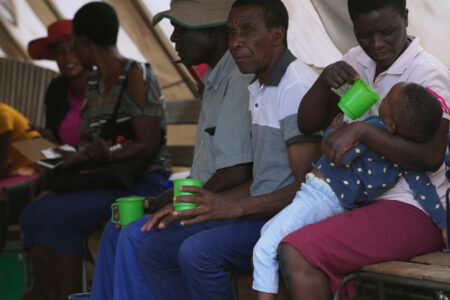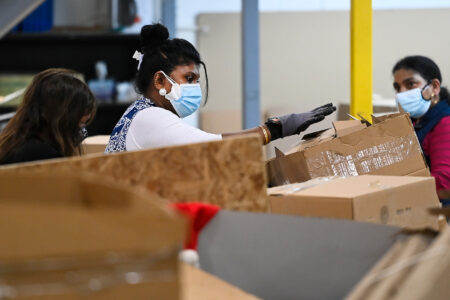
In late April, European Union member states agreed on the technical specifications for their proposed Digital Green Certificate. This certificate, often colloquially described as a vaccine passport, aims to restore free and safe movement within the European Union. Within days of this news, the president of the European Commission, Ursula von der Leyen suggested in a New York Times interview that European Union borders could also be open to vaccinated American tourists this summer. Canadian reporters swiftly turned to Prime Minister Trudeau to ask about the use of vaccination certificates for international travel.
In response, Trudeau said that vaccination certificates are to be expected as part of the response to the pandemic. At the same time he said “we’re not yet at this point.” He assured Canadians that the government will consult widely “to ensure what we are doing is grounded in science and will keep people safe.”
We agree that government policy should be scientifically rigorous and evidence-informed. It should also be ethically sound.
Scientific uncertainties
At this time, the only Canadian government publication on vaccination certificates is one recently authored by the Office of the Chief Science Advisor. The report, “Scientific Considerations for Using COVID-19 Vaccination Certificates” makes clear that the ability of any COVID-19 vaccination credentialing program to protect public health is dependent upon vaccines that can effectively prevent transmission of the virus and its variants.
The report then lists a number of scientific uncertainties with vaccine efficacy and virus transmission including uncertainty about “(i) the ability of vaccines to reduce/eliminate SARS-CoV-2 transmission, (ii) duration of immunity, (iii) correlates (indicators) of protection, (iv) vaccine efficacy/effectiveness in specific populations and in individuals with prior infection, and (v) protection against infection/reinfection by different virus variants.”
If vaccinated individuals develop COVID-19 symptoms, they are likely capable of transmitting the virus. And vaccine efficacy at preventing clinical COVID-19 varies substantially between the different vaccines; ranging from 64 per cent for AstraZeneca’s vaccine to 94 per cent for Moderna’s mRNA-1273. As well, vaccine efficacy varies across production facilities. For example, the Coronovac vaccine efficacy in preventing clinical COVID-19 increased from 51 per cent when produced in Sinovac’s facility in Brazil to 91 per cent when produced in Turkey.
The ever-expanding list of SARS-CoV-2 variants, B.1.1.7 (first detected in the United Kingdom), B.1.351 (first detected in South Africa), P.1 (first detected in Japan/Brazil), and B.1.617 (first detected in India) complicates matters further. For example, the AstraZeneca vaccine is less effective at protecting against moderate to severe COVID-19 caused by the B.1.351 variant. These variabilities have serious implications for ensuring safe international travel.
Also, yet to be determined is the duration of immunity with vaccination. At this time, it is unknown whether immunity to COVID-19 lasts beyond 8-10 months; duration of immunity could differ between vaccinations and with different variants. Length of protection is also likely to vary with an individual’s age and the robustness of their immune system. Moreover, scientists are still working to identify reliable markers of immunity in order to track levels of immunity in vaccinated individuals. At this point in time, robust scientific data cannot support the establishment of time frames for vaccine certification validity.
Vaccine inequity
In the European Union, Digital Green Certificates will be issued to those who have been vaccinated, those with a negative COVID-19 test, and those who have recently recovered from COVID-19. In this way, the commission insists the certification program will not discriminate against those who are not vaccinated.
The fact remains, however, that against a backdrop of immensely inequitable access to testing and to vaccine, the use of vaccination certificates will create another line of division between the haves and have nots – and further demarcate inequities between the Global North and the Global South.
To date, nearly 40 per cent of people living in wealthy countries like Germany, France, and Canada have received at least one dose of a vaccine. In comparison, at the time of publication, 0.8 per cent of the population in Sierra Leone had received one dose of vaccine, 1.62 per cent in Iran, 3.35 per cent in Laos, and 11.54 per cent in India. More generally, according to the World Health Organization, in April only 0.3 per cent of the vaccines administered around the world had gone to individuals living in low-income countries.
Vaccine production companies have signaled that they could make enough vaccines to vaccinate 70 per cent of the global population by the end of this year. However, intellectual property restrictions on generic manufacturing as well as geopolitical hurdles in vaccine distribution continue to impede this lifesaving goal. Wealthy governments, including Canada, continue to reject proposals to temporarily waive intellectual property and patent rights for COVID-19 vaccines.
Actively hindering the global distribution of vaccine to poor nations, while potentially limiting travel to only those who are vaccinated or have access to testing, is fundamentally unfair.
A Canadian plan
The World Health Organization (WHO) currently advises against the use of COVID-19 vaccination certificates due to scientific uncertainty about vaccine impacts on viral transmission and inequitable vaccine distribution. In time, with increasing knowledge and improved access to vaccine, the WHO recommendation may change. In the meantime it appears that international policy for COVID-19 vaccine certification is mainly being guided by governments in the Global North and the International Air Transport Association (IATA).
Ideally, Canada should advocate that all nations follow the WHO guidelines on vaccination certificates as they are today and as they are amended. With powerful political allies and economic interests clearly pulling in a different direction, however, this does not appear to be the plan. Minister of Health Patty Hajdu has assured Canadians that she is meeting regularly with G7 counterparts on what kind of certification or credentialing might be required for international travel.
This begs the question: What should be Canada’s plan?
Firstly, Canada should advocate for and endorse only a policy that protects public health. This requires a commitment to rely on the most up-to-date scientific data, and to use every precaution to manage scientific uncertainties. For example, as a safeguard against variabilities in vaccine efficacies, policy-makers could require viral testing of both outbound and inbound international travelers no matter their vaccination status. Making viral testing part of any plan for return to international travel could safely accommodate those who aren’t vaccinated, and safeguard public health given the many variabilities in vaccine efficacies.
Secondly, in support of global public health, Canada should at a minimum continue to support COVAX, the global initiative for fair vaccine distribution, and consider implementing vaccination certificate mandates for travel only once COVAX reaches stage 3 of its vaccine roll-out, which would see 20 per cent of the global population (those over 65 years of age and in high risk categories) vaccinated. To reach this goal, Canada should stand with countries endorsing a waiver of intellectual property rights on COVID-19 vaccines so that a broader group of companies can produce the vaccines needed to end the pandemic. On Wednesday, President Joe Biden announced the U.S. will now support the proposal for a temporary waiver.
Thirdly, if vaccination certificates are to be used for international travel, the legislation authorizing such use should include a sunset clause. COVID-19 vaccine certification may be necessary to protect public health during the pandemic, but it is imperative that the routine screening of travellers on the basis of biology not become the new normal. Policy could reflect that the implementation of vaccine certification, with all of its attendant ethical risks, is a temporary measure by including conditions and timelines for expiration. Establishing targets for expiration could have the additional benefit of encouraging global collaboration toward ending the pandemic sooner – saving millions of lives and eventually eliminating altogether the need for COVID-19 vaccination certificates.











